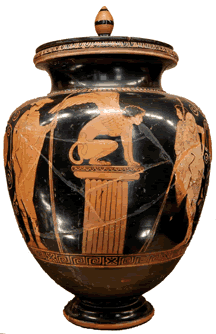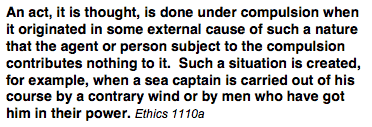
3) because of some mistake
While Aristotle rejects the depiction of the downfall of an entirely virtuous person as an option in tragedy, he does support the downfall of a character whose virtue is somewhat compromised. That person's downfall comes about as a result, not of his own wickedness but "because of some mistake" (δι᾽ ἁμαρτίαν τινά). The nature and role of that mistake (hamartia / ἁμαρτία) is an essential element in Aristotle's evaluation of the tragic act itself.

 Formerly an archery term meaning "a missing of the mark," Aristotle uses the term, "hamartia," in both the Poetics and the Nicomachean Ethics to mean an ignorance of some particular fact. In most cases, that ignorance involves the identity of a member of the tragic hero's own family. Oedipus, for example, fails to recognize his own father at the crossroads.
Formerly an archery term meaning "a missing of the mark," Aristotle uses the term, "hamartia," in both the Poetics and the Nicomachean Ethics to mean an ignorance of some particular fact. In most cases, that ignorance involves the identity of a member of the tragic hero's own family. Oedipus, for example, fails to recognize his own father at the crossroads.

It is curious that the term, "hamartia," has often been translated as a "tragic flaw," and has served as a code for "pride." A possible explanation for this transformation may be derived from the fact that "hamartia" eventually came to mean "sin" in New Testament Greek. In the Christian hierarchy, pride is the first of the seven deadly sins.
In the legal language of the Ethics, Aristotle allows an exception for judging acts of violence that he classifies as involuntary. Such acts should not of necessity be judged as unjust acts, and may not leave a permanent stain on the character of the doer. Furthermore, he distinguished between two classes of involuntary acts: those that are forced upon the perpetrator, and those that are cause by ignorance (δι᾽ ἄγνοιαν).

| under compulsion |  |
| as a result of ignorance |  |
 |
The predominate circumstances in Greek tragedies (particularly tragedies with complex plots) involve actions committed in a state of ignorance. However, acts, committed under compulsion, are also depicted, as in the case of Orestes murder of his mother, as portrayed in Aeschylus' Oresteia and parodied in Euripides' Orestes. Furthermore, in The Eumenides, this circumstance is actually bought before the original Athenian law court at the Areopagus - where Apollo appears as a witness and testifies that he forced Orestes to commit the murder for which he is being tried.
In some cases, the distinction between compulsion and ignorance is muddied at best. A good example of this is the case in which Dionysus clouds Agave's vision in The Bacchae. The outcome of this circumstance is that she acts in ignorance, mistaking her son, Pentheus, for a young mountain lion. But, on a larger scale, the ignorance Dionysus causes Agave to experience is merely part of his declared plan to complete his revenge on the unbelievers in the family of Semele. As a result, the unknowing Agave acts both in ignorance and under compulsion.